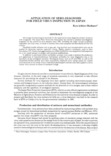Application of Sero-Diagnosis for Field Virus Inspection in Japan
Tropical agriculture research series : proceedings of a symposium on tropical agriculture researches
| ISSN | 03889386 |
|---|---|
| NII recode ID (NCID) | AA00870529 |

Full text
tars22-_101-105.pdf778.92 KB
Advantage of immunological methods for the rapid and accurate diagnosis of plant viruses is well recognized. The Japan Plant Protection Association has started to promote sero-diagnosis programs for the control of virus diseases since 1981. Including the major viruses in grasses, vegetables and fruit trees, 25 kinds of antisera have been prepared and distributed all over the country.
Simplified double diffusion test in agar gel, ring interface and microprecipitin tests can be applied for detecting common vegetable viruses. Highly sensitive techniques, such as latex flocculation (LF). Passive hemagglutination test (PHA) and ELISA were adopted for field inspection for a very small amount of antigen with practical modifications.
In addition to polyclonal (rabbit) antibodies, attempts were made to promote the production and application of monoclonal(mouse hybridoma) antibodies for virus diagnostics due to the specificity of the serological reactions. Serological assays, such as LF and PHA, as well as the (simplified) ELISA method, have been successfully employed every spring season for routine mass-detection of rice stripe virus in individual planthoppers and have also been applied to citrus mosaic virus surveys in scions of mandarin orange.
Simplified double diffusion test in agar gel, ring interface and microprecipitin tests can be applied for detecting common vegetable viruses. Highly sensitive techniques, such as latex flocculation (LF). Passive hemagglutination test (PHA) and ELISA were adopted for field inspection for a very small amount of antigen with practical modifications.
In addition to polyclonal (rabbit) antibodies, attempts were made to promote the production and application of monoclonal(mouse hybridoma) antibodies for virus diagnostics due to the specificity of the serological reactions. Serological assays, such as LF and PHA, as well as the (simplified) ELISA method, have been successfully employed every spring season for routine mass-detection of rice stripe virus in individual planthoppers and have also been applied to citrus mosaic virus surveys in scions of mandarin orange.
| Date of issued | |
|---|---|
| Creator | Ken-ichiro-Shohara |
| Publisher | Japan International Research Center for Agricultural Sciences |
| Volume | 22 |
| spage | 101 |
| epage | 105 |
| Language | eng |
